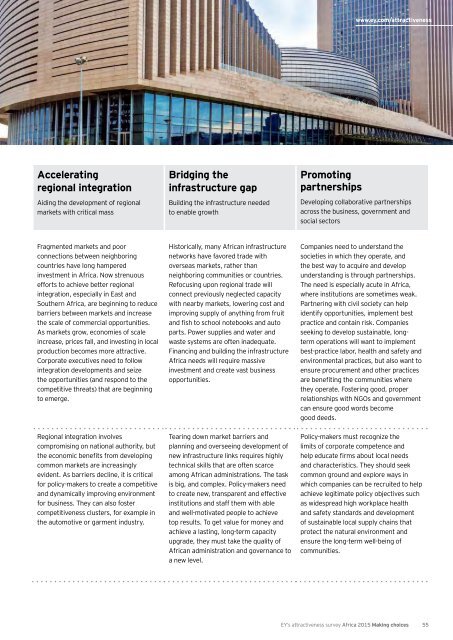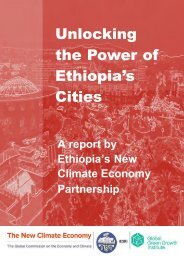EY-africa-attractiveness-survey-june-2015-final
EY-africa-attractiveness-survey-june-2015-final
EY-africa-attractiveness-survey-june-2015-final
Create successful ePaper yourself
Turn your PDF publications into a flip-book with our unique Google optimized e-Paper software.
www.ey.com/<strong>attractiveness</strong>Acceleratingregional integrationAiding the development of regionalmarkets with critical massBridging theinfrastructure gapBuilding the infrastructure neededto enable growthPromotingpartnershipsDeveloping collaborative partnershipsacross the business, government andsocial sectorsFragmented markets and poorconnections between neighboringcountries have long hamperedinvestment in Africa. Now strenuousefforts to achieve better regionalintegration, especially in East andSouthern Africa, are beginning to reducebarriers between markets and increasethe scale of commercial opportunities.As markets grow, economies of scaleincrease, prices fall, and investing in localproduction becomes more attractive.Corporate executives need to followintegration developments and seizethe opportunities (and respond to thecompetitive threats) that are beginningto emerge.Regional integration involvescompromising on national authority, butthe economic benefits from developingcommon markets are increasinglyevident. As barriers decline, it is criticalfor policy-makers to create a competitiveand dynamically improving environmentfor business. They can also fostercompetitiveness clusters, for example inthe automotive or garment industry.Historically, many African infrastructurenetworks have favored trade withoverseas markets, rather thanneighboring communities or countries.Refocusing upon regional trade willconnect previously neglected capacitywith nearby markets, lowering cost andimproving supply of anything from fruitand fish to school notebooks and autoparts. Power supplies and water andwaste systems are often inadequate.Financing and building the infrastructureAfrica needs will require massiveinvestment and create vast businessopportunities.Tearing down market barriers andplanning and overseeing development ofnew infrastructure links requires highlytechnical skills that are often scarceamong African administrations. The taskis big, and complex. Policy-makers needto create new, transparent and effectiveinstitutions and staff them with ableand well-motivated people to achievetop results. To get value for money andachieve a lasting, long-term capacityupgrade, they must take the quality ofAfrican administration and governance toa new level.Companies need to understand thesocieties in which they operate, andthe best way to acquire and developunderstanding is through partnerships.The need is especially acute in Africa,where institutions are sometimes weak.Partnering with civil society can helpidentify opportunities, implement bestpractice and contain risk. Companiesseeking to develop sustainable, longtermoperations will want to implementbest-practice labor, health and safety andenvironmental practices, but also want toensure procurement and other practicesare benefiting the communities wherethey operate. Fostering good, properrelationships with NGOs and governmentcan ensure good words becomegood deeds.Policy-makers must recognize thelimits of corporate competence andhelp educate firms about local needsand characteristics. They should seekcommon ground and explore ways inwhich companies can be recruited to helpachieve legitimate policy objectives suchas widespread high workplace healthand safety standards and developmentof sustainable local supply chains thatprotect the natural environment andensure the long-term well-being ofcommunities.<strong>EY</strong>’s <strong>attractiveness</strong> <strong>survey</strong> Africa <strong>2015</strong> Making choices55



